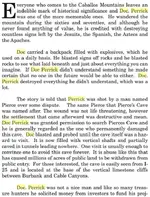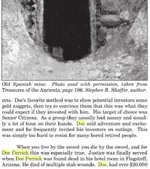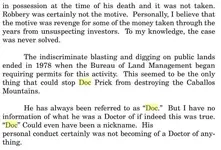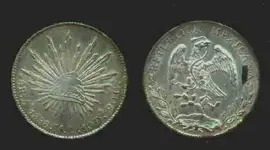Spanish Mines were regulated but you don't think folks who didn't want to play by the rules didn't occasionally take out on their own and do things their own way?
I've often thought two things on this issue....
1) There were absolutely mining groups that decided to take their chances, disobey the crown, and keep the whole kit'n caboodle for themselves. A basic understanding of human nature would make this not only a possibility, but one of high likelihood. The Spaniards had a LOT of wide open spaces to disappear into and carry this out. I think there is virtually no doubt that this took place.
2) There is probably virtually no "proof" that any of number 1 took place. Clandestine parties wouldn't have taken priests with them, they wouldn't have kept journals of their travels or an accounting of their finds to keep their 5th straight. Bottom line, the very things that would have made my first point a likelihood are the very reasons why it will likely never be VERIFIABLE.
In theory, No. 1 makes some sense and I agree there likely were a few free agents that tested the waters. However, when reality raises its ugly head and the cost and logistics of a mining expedition several hundred miles or more north of the Northern Frontier of Mexico is considered, the number of such ventures shrinks drastically. First, someone had to pay the bills. The classic Conquistador expeditions were funded by very rich Europeans, and unless the crew agreed to work for shares of a predetermined sure thing - which was pretty much the case in Peru and Mexico in the early days - they expected to be paid for the risk. Horses were expensive, and so was armor and other gear. Look at the Coronado Expedition.
Second, where did the food come from? A traveling party in uncharted country has to eat every day, probably lots. They can't carry enough to sustain themselves for long, so they'd have to live off the land. They can hunt for meat, sure, if there is game enough to consistently feed them all. They can steal some squash and melons from Natives here and there, sure, but how many villages are they going to find in the mountains? Eating every day is a challenge enough in a settlement - for a relatively large group of explorers, even more challenging.
Third, a mining venture requires even more expense than a simple exploration project. More tools and more horses to carry them. More skilled personnel and more money to pay them. Looking for placer in streams is one thing - low tech and easy - but lode mining is a whole new and more complicated ball game, requiring more people and more resources. Just review
De Re Metallica for the mining technology used during the Renaissance period. This all assumes, of course, that a "fabulously rich vein" was discovered somewhere in the wilderness. What are the odds of that happening? If it did, a permanent camp would need to be established, and a sustainable food chain secured to support the operation. Oh, and the mercury needed for metal recovery? It had to come from the Crown, which controlled it all in the New World. So much for a secret mission.
Fourth, why venture so far north when very rich ore was and still is available in Northern Mexico?
IMO, a few ventures such as the treasure magazines describe did occur in North America. Very few, maybe one for every fifty legends - or less.













